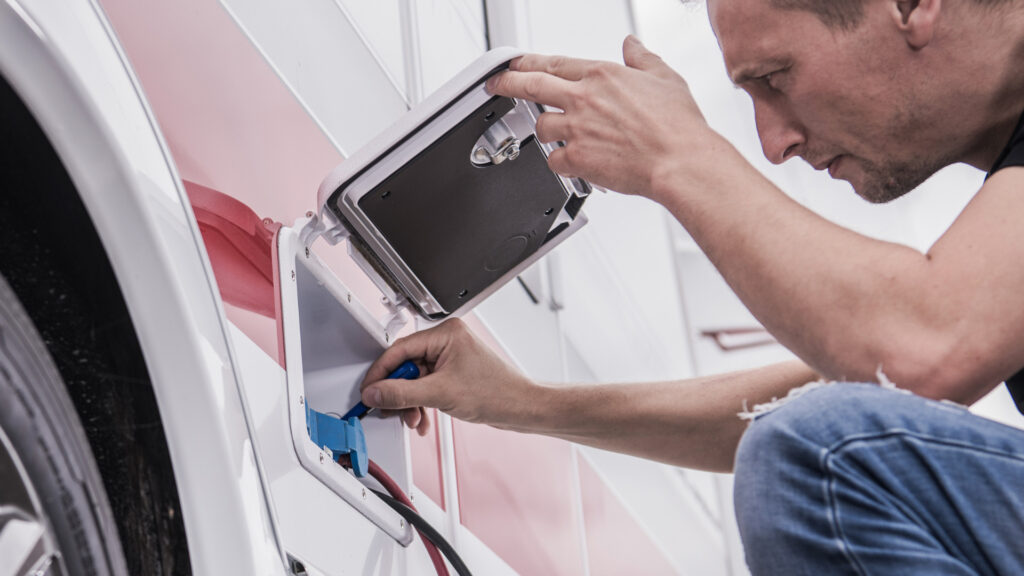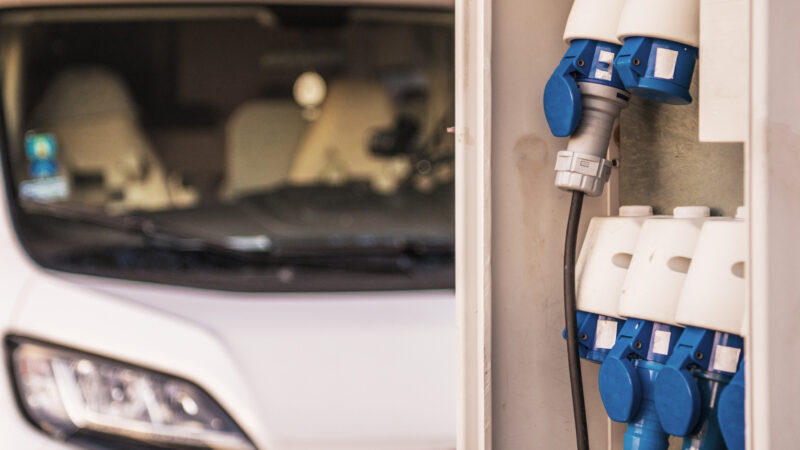Table of Contents Show
Owning an RV can be a shocking experience, literally and figuratively. You can experience various hazards while using your camper. However, one such hazard, “hot skin,” is extremely serious and not something you can ignore.
Whether traveling full-time or heading out for weekend adventures, we want you and those traveling with you to be as safe as possible. Failure to do so could derail your trip in the blink of an eye and have devastating consequences.
So what is hot skin, and how can you prevent it? Let’s take a closer look!
What Is RV Hot Skin?
RV hot skin is an electrical condition occurring when an RV becomes electrified due to faulty wiring or other issues. Essentially, it means that the metal frame or body of the RV has become energized with electricity. This creates a serious safety hazard, especially when entering and leaving the camper.
If you suspect you’re experiencing hot skin with your rig, don’t ignore it. Whatever is causing the issue isn’t going to fix itself. It will likely only get worse.
While it may not be convenient or cheap, hire an experienced professional to come to check out your rig. They can identify and address the cause of the hot skin.
What Causes Hot Skin in an RV?
The main cause of hot skin in an RV is typically faulty wiring, electrical faults, and short circuits.
These issues can cause the electrical current to flow through the exterior surfaces of a camper. The first place to check is typically the ground wiring. Hot skin can occur with a loose connection or break in the wiring.
Another common cause of hot skin is a damaged electrical cord. You must inspect your cord for any damage. However, always unplug your power cord from the electrical outlet when inspecting it. If there is damage to the cord, you don’t want to risk getting shocked in the process.
Again, if you suspect your RV may have hot skin, it’s important to address the issue immediately. Consult a professional electrician or RV technician as soon as possible. You must take hot skin seriously.
Is Hot Skin Dangerous in an RV?
Unfortunately, hot skin is a very dangerous situation in an RV. In certain situations, it can even be deadly. We’ve heard horror stories of individuals getting severely shocked by their RV. Lucky individuals can typically resolve the issues, but that’s not always the case.
In 2014, 3-year-old Landyn Gerald Keener received a powerful and fatal shock from his family’s Airstream trailer. The young boy was leaving the trailer, and authorities believe his feet were wet from the grass.
Unbeknownst to him, when he grabbed the metal door handle to close the door, his feet completed the current and sent the electricity through his body.
Landyn’s family experienced a nightmare that day that no family should ever have to experience. We grieve for Landyn’s family and their loss.
We also hope their story alerts more owners of the potential hidden dangers of hot skin so they take the proper steps to test for it regularly.
How Do You Test for Hot Skin?
You must do all you can to protect yourself and others from hot skin. Luckily, you can take some steps to test for it to help you detect it as early as possible.
Let’s look at the steps necessary to test for hot skin on your camper.
Turn off Electrical Devices
The first thing you need to do when you start testing for hot skin is to turn off all of the electrical devices. This includes air conditioning units, lights, and other appliances.
When electrical devices are on in the RV, they can create a current flow that can interfere with the voltage tester, potentially leading to inaccurate readings.
By turning off all electrical devices, the RV’s electrical system is effectively off, making detecting any electrical faults or issues in its wiring easier. This ensures that the voltage tester only detects current caused by hot skin, not interference from other electrical devices.
Keep in Mind: When you own an RV, it’s essential you have a good Understanding of Your RV Electrical Panel!

Use a Non-Contact Voltage Tester
You can test your RV yourself for hot skin by using a non-contact voltage tester. You can typically find these for $20 to $30, but they’re worth more than their weight in gold if they help prevent a tragedy.
- NON-CONTACT DETECTION of AC voltage in cables, cords, circuit breakers, lighting fixtures, switches,...
- VISUAL AND AUDIBLE INDICATORS of voltage detection with a high intensity, bright red LED, and an audible tone
These devices can detect electrical fields, including hot skin. All you have to do is hold the non-contact voltage tester close to the metal pieces on the RV that are not in direct contact with the ground.
The most common spots to check are door handles, steps, or awning arms. If the device detects an electrical field, it will make a noise or light up.
You’ll then want to use a contact voltage tester to confirm the reading. This will allow you to pinpoint the source of the problem and devise a plan to fix it. However, if you’re uncomfortable with this, contact a professional immediately and discontinue using your rig until you can resolve the issue.
Check Your Entire RV
Don’t make the mistake of checking one small section or one piece of metal and thinking everything is fine. It’s a good idea to check as many metal surfaces as possible.
It doesn’t hurt to spend a little extra time to be diligent. It’s always better to be safe than sorry when dealing with electricity.
Repeat Test Regularly
Just because your RV passed with flying colors once doesn’t mean that will always be the case.
You must repeat the test regularly. Make testing your rig part of your winterizing and de-winterizing list, and check multiple times during the camping season.
It only takes a few minutes to go through and check some of the major danger spots like stairs, door handles, and other metal components. If you have a few spare minutes during a trip, grab your non-contact voltage tester and run it over the various surfaces.
What’s the worst that can happen? You waste a few minutes confirming that everything is safe. Or you could discover an issue that could save a loved one’s life.
Keep in Mind: If you’re looking for a guide to dewinterizing an RV, we’ve got you covered!

Understand and Address the Risks of ‘Hot Skin’
We cannot encourage you enough to take hot skin seriously. This hidden danger can quickly turn your epic adventures into a horrific nightmare. We don’t want anyone to experience anything like the Keener family we mentioned earlier.
Being a responsible RV owner means going above and beyond to ensure the safety of everyone camping with you. So be responsible and understand and address the risks of hot skin and your RV before it’s too late.
Last update on 2025-01-21 / Affiliate links / Images from Amazon Product Advertising API







